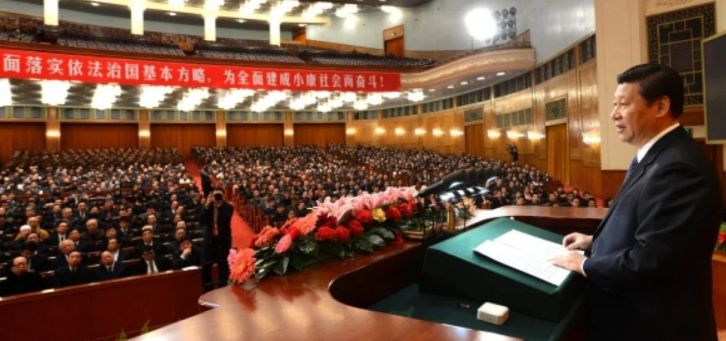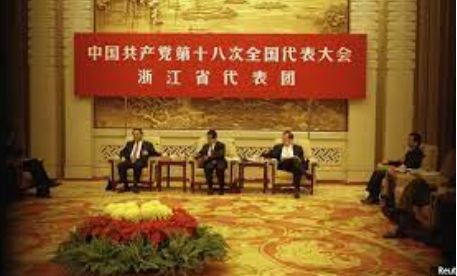By Eric Vandenbroeck
and co-workers
“Document Number Nine”
On Sept. 20, popular
Chinese live-streamer Li Jiaqi, known as the “lipstick king” for his impressive
ability to push lipstick sales and other makeup products, reappeared on Chinese
streams for the first time in three months. Li had disappeared from the Chinese internet for a mistake he
probably had no idea he was making. In the middle of his summer sales push, on
June 3, one of his employees brought out a cake in the shape of a tank. Alas, June 4 is
the anniversary of the Tiananmen massacre of 1989, and the Chinese authorities
relentlessly police any hint of commemoration.
Li and many of his
fans were born after the massacre occurred. They may not have even been aware
it happened. China has long policed historical memory, deleting and rewriting
references to past atrocities and insisting on adherence to official
narratives. As President Xi Jinping said in a speech last year, “know history; love the party.”
Today, that relentless censorship is increasingly focused online.

Ahead of the critical
20th Party Congress starting on Oct.16, the Cyberspace Administration of China
(CAC) is inviting netizens to snitch on those guilty of “historical nihilism.”
Officials have used
the term for decades, but it was given new importance when it was listed as one
of the seven ideological threats the party faces in Document No. 9, which was leaked in 2013 as a political
directive issued at the outset of Xi’s presidency, shows that the CCP perceives
a liberal world order as inherently threatening:
“Western anti-China forces and internal ‘dissidents’ are still actively trying
to infiltrate China’s ideological sphere.”It
states Xi’s intellectual agenda as he began his tenure as party chairman.
According to the document, historical nihilism is tantamount to denying the
legitimacy of the CCP’s long-term political
dominance.

Any fact, statistic,
opinion, or memory that doesn’t fit into the official line can thus be framed
as a violation of the party’s anti-historical nihilism campaign. Authorities
are taking action: More than 2 million social media posts alleged to be
“disseminating historical nihilism” were reportedly deleted in the months before last year's centennial
celebration of the Chinese Communist Party (CCP). In a speech last April, CAC
Director Zhuang Rongwen described the necessity of “powerfully refuting historical
nihilism and other incorrect ideological standpoints” on the internet.
Incorrect ideology is
also why the Chinese Communist Party (CCP) did not issue a message of
condolence on the death of former Soviet leader Mikhail Gorbachev. In the
words of Tsinghua University academic, Xie Maosong,
“China’s decades-long economic success has shown the country has moved on, and
there is no point in discussing Gorbachev.”
According to Christopher Vassallo, a China analyst at Blackstone,
during the Xi era, there has been a fundamental shift from an emphasis on
economic or leadership failure as the causes for the Soviet Union’s demise to
more nebulous concepts of cultural, societal, or “moral” decay.
The leadership’s
incentives for tackling so-called historical nihilism are even more explicit.
Framing the past as a justification for present
party leadership is essential for the CCP and its leaders.
Subjects of Marxism
and inheritors of Maoism argue the primacy of the party is the result of
historical inevitability. As stated in Document No. 9, one facet of historical
nihilism is “denying the historical inevitability in China’s choice of the
socialist road.” The apparent need to exert historical control, even and
especially as online platforms get more advanced and intertwined with everyday
life, demonstrates party officials’ and, specifically, Xi’s belief that
tolerating contested histories threatens the legitimacy and stability of the
regime.
Xi uniquely
understands why historical grudges and differing views about the past are so
potentially explosive. That’s because his father, a prominent CCP leader, was
part of a revolution-era clique from the northwest rife with violence and,
later, controversy over how to write or omit such violence into party history.
As Xi Zhongxun said at a meeting held to resolve the
history of party violence in the northwest in 1945, while it was “no big deal”
if people were ignorant about history, “the most damaging is the distortion and
falsification of history.”
Xi Zhongxun, however, also is reported to
have had a good relationship with the Dalai Lama before he fled China in 1959.
Historical nihilism
is important enough to merit its reporting center, where netizens can rat on each other for sharing
posts that “distort the history of the party or the history of new China.”
The incentives to
snitch are strong. In the context of restrained civil liberties and curtailed
political and, increasingly, personal freedoms, defending the party’s version
of China’s history, the only version of history it can safely be proud of, is
one way to guarantee your safety—or to advance your career.
For updates click hompage here